#Ukrainian People's Republic
Text

Illustrated Ukrainian magazine "Oko" No. 9 for 1918. Published during the period of the Ukrainian People's Republic. It was published weekly in two editions in Russian and Ukrainian. A total of 18 issues were printed, each containing 16 pages. The editor of the publication was F. Lindenov.
#Kobzar Library#magazine#Ukrainian People's Republic#ukrainian art#ukrainian history#history#Ukraine
88 notes
·
View notes
Photo

Our Enemies Will Die, as the Dew Does in the Sunshine, And We, Too, Brothers, We'll Live Lappily in Our Land... by Bohush Shippikh, 1917
#Bohush Shippikh#Ukrainian art#1910s#Ukrainian flag#Ukrainian anthem#Ukraine#Ukrainian People's Republic#UNR
189 notes
·
View notes
Text

Young couple from Kharkiv
Date: 1919
Country: UPR
#ukrainians#folk costume#historical photos#1910s#20th century#upr#ukrainian people`s republic#ukraine#kharkiv#slavic
5 notes
·
View notes
Text
🇷🇺🇺🇦 🚨 DPR COURT SENTENCES UKRAINIAN SERVICEMAN TO 30 YEARS IN PRISON FOR OPENING FIRE ON FAMILY IN MARIUPOL
The Supreme Court of the DPR sentenced Ukrainian serviceman Vitaly Matvienko to 30 years in prison for the murder of six civilians in Mariupol and the attempt on the lives of four more.
The court established that at the end of March 2022, Matvienko, on the orders of the commander, shot a car with a family inside from a machine gun. Two days later, the serviceman and his colleagues machine-gunned a convoy of three cars with white tape on the mirrors.
@WorkerSolidarityNews
#dpr#ukraine#ukraine war#russia ukraine war#ukraine news#russia#donetsk peoples republic#russia news#war crimes#ukraine war crimes#ukrainian war crimes#war#war news#war update#russo ukrainian war#russia ukraine conflict#news#world news#global news#international news#breaking news#current events#politics#geopolitics#eastern europe#eurasia#russia ukraine today#wars#WorkerSolidarityNews#ukraine war news
7 notes
·
View notes
Text
Matt Gaetz has been one of the most vocal Republicans in Congress when it comes to cracking down on China. It had to be more than a little embarrassing on Tuesday, then, when the Florida congressman got called out in a House Armed Services Committee hearing for citing Chinese propaganda while trying to make a point about cutting off U.S. aid to Ukraine.
“Is the Azov Battalion getting access to U.S. weapons?” Gaetz asked Colin Kahl, the U.S. defense undersecretary for policy. The Azov Battalion is a controversial, far-right unit within Ukraine’s national guard. Kahl seemed confused. “Not that I’m aware of,” he said. “But if you have information I’d be happy to hear it.”
Gaetz then entered into the record a report from the Global Times about how the Azov Battalion was getting U.S. weapons as far back as 2018. “Any reason to disagree with that assessment?”
“I’m sorry, is this the Global Times from China?” Kahl asked.
“No, this is—” Gaetz began before looking at his notes. “It might be, yeah,” he continued.
“As a general matter, I don’t take Beijing’s propaganda at face value,” Kahl said.
Gaetz asked him to answer the question. “I don’t have any evidence one way or the other,” Kahl said before reiterating that he doesn’t take Beijing’s propaganda at face value.
“Fair enough, I would agree with that assessment,” Gaetz said before quickly moving on.

Khal wasn’t the only one who dunked on Gaetz on Tuesday. Rep. Eric Swalwell called him out for inviting Corey Beekman, a combat veteran, to lead the Pledge of Allegiance ahead of the year’s first Judiciary Committee hearing. “It is my pleasure and distinct honor to introduce to the committee Staff Sergeant Corey Ryan Beekman, an American hero and a constituent of mine residing in Pensacola, Florida,” Gaetz said.
As Swalwell pointed out on Tuesday, Beekman is an accused murderer who wound up in a standoff with police. “That’s why there’s a trust deficit here,” Swalwell said. “You pull off a public stunt to try to own the libs, and what you did is you brought in a guy who allegedly shot two people and killed one of them. That’s where the trust deficit is.”

Gaetz apologized to the family of Billy Buchanan, whom Beekman allegedly shot and killed, in a statement to the Daily Beast earlier this month. “The family of Billy Buchanan brought the situation to my attention, and I’m glad they did,” Gaetz said, adding that the decision had some “unintended consequences.”
#us politics#twitter#tweet#news#2023#118th congress#House Armed Services Committee#rep. matt gaetz#rolling stone#rolling stone magazine#china#people's republic of china#Chinese propaganda#ukraine aid#ukrainian crisis#ukraine#Azov Battalion#Colin Kahl#department of defense#biden administration#Global Times#rep. eric swalwell#aaron rupar#Corey Beekman#house judiciary committee#pledge of allegiance#the recount
27 notes
·
View notes
Note
Wait, whats happening with your presidential candidates? What was the fuckup?
During the presidential debate, Babiš was asked, whether he would send our soldiers to help other NATO countries, like Poland or the Baltic states, in the scenario they got invaded....
And he said no, that he wouldnt.. That he wants peace and not war, so he wouldnt like to send anyone anywhere...
N basically that he doesnt want to even consider to think about this scenario... which is.. hmm.. not great especially in these times.
So of course our neighbors are now rather concerned.
#politics#:I#czech republic#really cool that babiš apparently doesnt know about NATO article 5#or like that he knows but is obviously pandering to people who say war on ukraine aint real#or that its just a strain on our state and that ukrainians should just stop#and give up
11 notes
·
View notes
Text

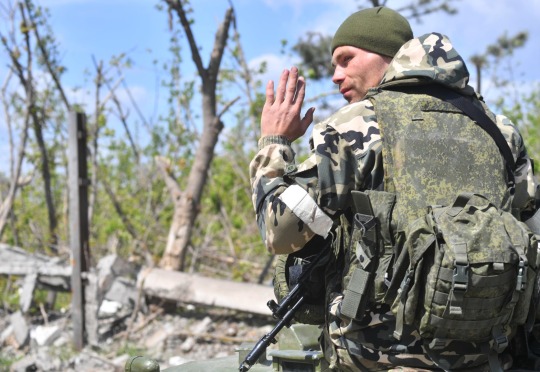

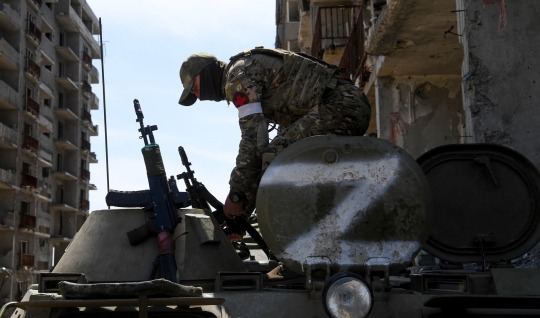
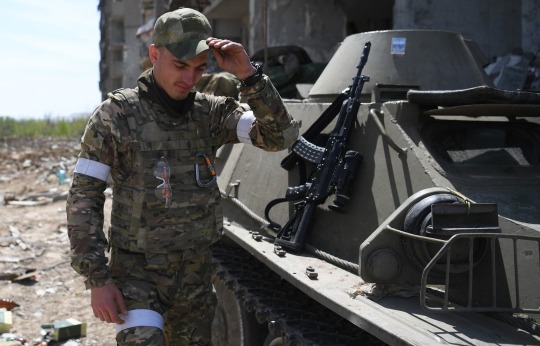
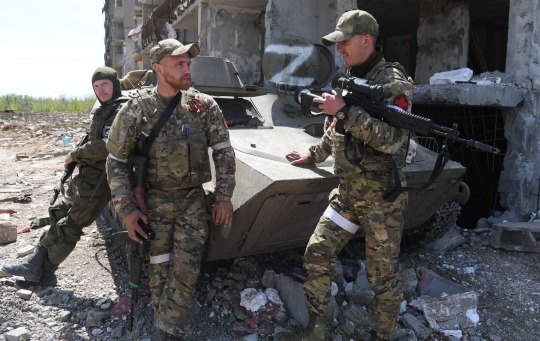
Mariupol Offensive // Donetsk People's Republic
#2022 Russo-Ukrainian War#Russo-Ukrainian War#Russo-Ukrainian Crisis#Russian invasion of ukraine#invasion of ukraine#invasion#Mariupol#Mariupol Offensive#May Offensive#April Offensive#Russian Forces#Donetsk People’s Republic#DPR#Siege of Mariupol#Russian Naval Infantry#Naval Infantry#Alexey Kudenko#AK-12#AK-74#Kalashnikov#Azovstal#BMD#BMD-4#Donetsk#gunblr#milblr#armed forces#Donetsk Oblast
17 notes
·
View notes
Text

An early postcard in Soviet Ukraine of the first soviet government — the Peoples Secretariat of the Ukrainian Peoples Republic, December 1917.
8 notes
·
View notes
Photo
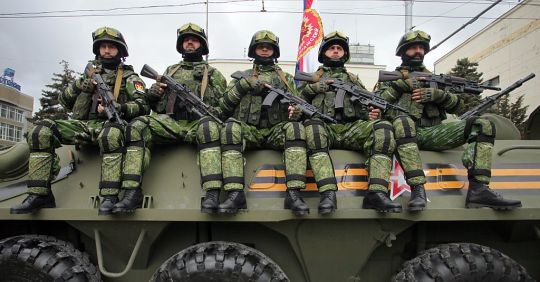
“Vera Iastrebova, a Donetsk lawyer and labor movement activist, reported on social media on February 26 that mothers and wives in the Donetsk and Luhansk “people’s republics” were desperately seeking ways to protect their menfolk from compulsory mobilization in the now-unfolding war.
“They call and say that the men are being taken from the [coal] mines and sent straight to the front, even though they have no military experience,” Iastrebova wrote.
Earlier in the week, activists in Ukrainian government–controlled territory had heard from their comrades in the “republics” that, since their militia had not conscripted sufficient soldiers, the over-fifty-fives were being called up.
Such realities stand in bleak contrast to the Kremlin’s rhetoric about the statelets as bastions of opposition to a “Nazi” regime.
The areas, known in Russian as Donetskaya Narodnaya Respublika (DNR) and Luganskaya Narodnaya Respublika (LNR), comprise the eastern part of the Donetsk and Luhansk regions respectively; the western parts have remained under Ukrainian government control even after 2014. Despite the “people’s republic” names, they have routinely intimidated organized labor and political dissidents, institutionalized violence, and trampled on human rights. They have also presided over the collapse of industry and a catastrophic fall in living standards.
The harsh conditions normalized since these statelets were founded in 2014 are not an exact guide to how Russian-supported forces, or Russia itself, might administer other parts of Ukraine if they take them over by force. But the misery heaped on the population of these “people’s republics” across the last eight years does give some indications.
Here, I shall focus first on the preparations for President Vladimir Putin’s announcement on February 21 that Russia recognizes the “republics,” followed on February 24 by the full-scale invasion of Ukraine. I then outline how the “republics”’ economies, politics, and labor movements have changed since their creation eight years ago.
The Run-Up to Recognition
By the end of the 2014–15 war in Eastern Ukraine, extreme Russian nationalists’ aspirations to establish the state of Novorossiya, comprising Ukraine’s six southeastern regions, had been abandoned. Putin had referred to the idea in speeches in 2014 but then shelved it. The two “people’s republics” were to remain separate from each other and from Russia.
The Minsk II agreement of 2015 required Ukraine to decentralize and armed formations to withdraw, but neither happened, and at first Moscow appeared content to leave these statelets as they were, a thorn in the side of the Ukrainian state.
The first sign that the Kremlin’s policy was shifting toward recognition and/or integration was the drive, kick-started by two presidential decrees in mid-2019, to grant Russian citizenship to Russian-speaking Ukrainians, both in the “republics” and in Ukrainian-controlled territory. More than 800,000 passports have now been distributed — equivalent to more than one-third of the statelets’ remaining adult population.
A report by the Eastern Human Rights Group (EHRG), founded by trade union activists displaced from Donetsk to Ukrainian-controlled territory, concluded that “passportization” was part of a drive toward “permanent [Russian] control” of the “republics.” It went with militarization (specifically, the introduction of “military-patriotic” education in schools and sports clubs) and integration of the education system with Russia’s.
Prior to the 2021 parliamentary election in Russia, residents of the “republics” were encouraged to vote online or bused to polling stations in the Rostov region of Russia. Halya Coynash of the Kharkiv Human Rights Protection Group reported that residents were being “enrolled en masse” into United Russia (UR), the dominant, pro-Putin party in the Russian parliament.
On Election Day last year, Dmitry Sablin, a leading UR parliamentarian, arrived in Donetsk and announced that an experiment was underway in “uniting this territory with Russia.” A barrage of similar sound-bites led observers to believe that the Kremlin was considering annexation, rather than recognition, of the “republics.”
The way for UR’s propaganda offensive had been paved by the Russian parliament’s loyal opposition parties, A Just Russia — for Truth (Spravedlivaya Rossiya — Za Pravdu, SRZP) and the Communist Party of the Russian Federation (CPRF), whose representatives had travelled to Donbas regularly since 2015. Sergey Mironov, former chairman of the Russian parliament’s upper house and leader of A Just Russia, a nominally social democratic but fiercely nationalist party, was an early advocate of integration of the “republics” with Russia. And it was CPRF deputies that last month made the motion in the Russian parliament — which UR then supported — urging Putin to recognize the “republics.” Two CPRF deputies have since protested against the war itself.
The promotion of the “Russian world” — which, in Putin’s view, includes swaths of Ukraine and other former Soviet states, as well as Russia itself — has a vicious side: the “republics” set their violent, arbitrary law enforcement agencies on Ukrainian speakers and supporters of the Ukrainian government. Top of a list of assaults on freedom of expression in 2019–21, compiled by the United Nations’ human rights agency, was the 13.5-year jail sentence handed to a Luhansk businessman who publicly expressed pro-Ukrainian views.
Three men arrested in 2020, for singing songs in Ukrainian, praising the Kiev government, and criticizing the Luhansk authorities, were still locked up without trial when the report was published in October 2021. The Luhansk “people’s republic” does not share information with the UN, and so their whereabouts remained unknown.
The slide toward integration has also heaped tragedy on residents of the “republics” who need to travel to Ukrainian government–controlled territory, including many social benefits recipients. Most crossing points across the separation line were closed during the COVID-19 pandemic. Local transport operators started offering trips via Russian territory; Ukrainian border officials were fining many people who made these journeys, until protests by community activists got the law changed.
From Powerhouse to Wasteland
The Donbas (i.e., the Donetsk and Luhansk regions, of which the “republics” occupy parts) was, historically, a renowned center of coal mining, steelmaking, and chemicals production.
As Ukraine recovered from the disastrous economic slump that followed the breakup of the Soviet Union in 1991, the Donbas economy leaned increasingly on exports of steel, coal, and railway locomotives. Russia remained its largest market. Other regions’ economies grew faster, benefiting in some cases from newer industries and services. But the 2014–15 war, and the division of the Donbas that followed, uprooted its population and trashed its industrial base.
By 2021, the war had claimed an estimated 14,000 lives, of which about four thousand were civilians, and left an estimated 30,000 injured. It dispersed much of the population of the Donbas: of a prewar population of 6.6 million, an estimated 3.3 million people have fled their homes. Of these, 1.8 million have been living as internally displaced persons (IDPs) in Ukraine and 1.5 million in Russia and Belarus. Whole towns and villages have been emptied of their populations.
And even before the Russian invasion this year, the UN categorized the Donbas as one of the world’s most mine-contaminated areas in the world.
In the first four years of conflict (2014–17), Donbas’s economy shrunk by 61 percent, the economist Vlad Mykhnenko found — largely due to “rapid and severe deindustrialization.” Luhansk’s industrial output fell by more than four-fifths, and Donetsk’s by half. Dozens of mines have closed and flooded, while small-scale, informal coal production has been de facto legalized. Steel works and manufacturing capacity lie idle.
Foreign trade collapsed, with Luhansk’s grinding almost to a halt and Donetsk’s falling by nearly two-thirds. What remains of the statelets’ economy is closely linked to Russia’s, and the ruble has been the main currency since 2015.
Living standards have crashed. Mykhnenko showed that in 2017 average wages in the Donetsk “people’s republic” were $174/month (38 percent of the pre-2014 level) and in the Luhansk “republic” $229/month (56 percent of the pre-2014 level). Nonpayment of wages is endemic.
Unemployment in the government-controlled parts of Donbas was 14-16 percent in 2018. No statistics were available for the “people’s republics,” but the level is similar. At the same time, there is a shortage of skilled labor, including medical staff, mine workers, and educators. Skilled workers leave if they can, a survey by the EHRG showed: labor migration to Russia is encouraged by the authorities.
Before 2014, much of Donbas heavy industry was controlled by the SKM financial group, whose owner, Rinat Akhmetov, is one of Ukraine’s richest politically influential businessmen (oligarchs). In February 2017, Ukrainian nationalists linked to Igor Kolomoisky, a competing oligarch, blockaded exports of Akhmetov’s coal from the “republics” to Ukraine. The action was opposed by organized labor.
The separatists’ armed forces responded by seizing Akhmetov’s assets, and — despite some rhetoric about “nationalization” — handed them to Vneshtorgservis (VTS), a company registered in South Ossetia, a Russian-occupied enclave in Georgia, and controlled by Serhiy Kurchenko, a billionaire linked to former Ukrainian president Viktor Yanukovich. (In mid-2021, Kurchenko was replaced by Yevgeny Yurchenko.)
The cooperation between VTS and the political and military leadership of the “people’s republics,” as well as Russian elite circles, goes far beyond a “revolving-door” effect. Most observers see them as inseparable.
The sociologist Serhiy Kudelia wrote in 2017, “In reality, the ‘republics’ are beginning to acquire the features of a military bureaucratic regime, in which military personnel and officials dominate society through coercion and the monpolisation of the distribution of wealth.”
The economic disaster in the “people’s republics” cannot be attributed to their political leaderships alone; it is largely the product of war and recession. But it is a terrible fact of twenty-first-century capitalism that the economy could have been turned around, and the transition to new types of industry begun, with only a fraction of the resources that the Russian state is now plunging in to laying waste to Ukraine.
Labor and Authoritarian Control
The militarized authorities in the “people’s republics” have drastically cut down space for social and political activity. A UN report concluded that there is no public discussion of “more sensitive political topics” due to “fear and self-censorship” and that protests over economic conditions, such as strikes, face “serious consequences, including arbitrary detention.”
Despite the statelets’ name, real popular involvement in politics faces sharp institutional limits. In the Donetsk “people’s republic,” military authorities in 2014 introduced a “nonparty democracy” (!). The “people’s council” wields political power and allows one legal party, the Communist Party of the Donetsk People’s Republic — although it excluded Communist Party representatives from its own ranks in 2016. Parliament is dominated by two “social movements,” with a high proportion of military commanders in their ranks. The researcher Kimitaka Matsuzato has shown how Vladislav Surkov, the Kremlin power broker, worked with Donetsk officials to put the system together.
Organized workers’ action has been extremely rare in the “republics.” The most well-known action of recent years was an underground sit-in by 119 mine workers, over months’ worth of unpaid wages, at the Komsomolskaya mine in Antratsyt. Fourteen activists were arrested under article 252 of the statelet’s criminal code, which penalizes “repeated breach of established order, organization or conduct of assemblies, meetings, demonstrations, marches or pickets” with up to five years in prison. The dispute ended when they were released, and part of the outstanding wages were paid.
The public intimidation of civil society is backed up by a less transparent system of torture, humiliation, and forced labor in military prisons. The journalist Stanislav Aseyev, who spent thirty-one months in custody in Donetsk in 2017–19 and was released in a prisoner exchange, documented physical torture (electric shock treatment and beating of the genitals), rape of men and women, and other mistreatment, of himself and others.
The trade union activists of EHRG exposed the use of slave labor in Luhansk prisons in a 2016 report. Prisoners convicted under Ukrainian law before 2014 found themselves at the mercy of an extralegal regime that put prisoners to work in joinery and metalworking shops, and other production, without pay.
Prisoners who refused to work were severely beaten by armed, masked men; kept in solitary confinement with no food or water for three days; and forced by the threat of beating to stand for eight to ten hours in the burning sun. When prisoners protested collectively, guards called special detachments from the statelet’s internal affairs ministry to attack them.
Trade union activists and human rights defenders have mostly left the “people’s republics,” after a crackdown in 2014; those who stayed keep “low profiles in fear of persecution,” the UN report stated. Women’s rights organizations and support groups for victims of domestic violence, too, operate in the shadows.
Groups that have organized in the Ukrainian-controlled parts of the Donbas, and supported social movements in the “republics” when opportunities have arisen, include:
The EHRG, which has supported independent worker organization. Pavel Lisyansky, a lawyer with EHRG and former miners’ union official, said in a 2017 interview that the union structures approved by the “republics” had been “formed to control workers.” Worker militants in the “republics” have “no law, no rights, people are defenceless.”
The pacifist group Black Days of Donbas, set up by Enrike Menendez (a Donbas citizen of Spanish heritage). It demands that the Ukrainian government name a day to remember the civilian deaths of the war in Eastern Ukraine.
Women’s organizations, including: the Women’s Human Rights Group, formed in 2017 by Irina Nikulnikova, a lawyer, in response to anger over unpaid wages at the coal company Lisichanskugol; a group started by Vera Iastrebova that staged a march for women’s rights on International Women’s Day in 2018 at Lisichansk; and the Civil Inspection of Labor group, formed in 2014 in Debaltsevo to defend labor rights, social and economic rights, and women’s rights.
The Donbas “people’s republics” have, throughout their existence, been politically and militarily supported by the Russian government. Their economies are closely tied to Russia’s. Should Russia retain control of other parts of Ukraine, elements of this type of rule may be replicated.”
- Simon Pirani, “The Russian Statelets in the Donbas Are No “People’s Republics.” Jacobin. March 2, 2022.
#donetsk people's republic#lugansk people's republic#russia-ukraine war 2022#russia-ukraine conflict#ukrainian civil war#ukrainian politics#russian imperialism#russian federation#authoritarian regime#analysis#donbas
2 notes
·
View notes
Text

Demonstration in Kyiv in March 1918 in support of Ukrainian statehood and the The Peace Treaty of Brest-Litovsk. Photograph taken by a German correspondent, from the collection of the Imperial War Museum, London.
Article VI. Russia obligates herself to conclude peace at once with the Ukrainian People's Republic and to recognize the treaty of peace between that State and the Powers of the Quadruple Alliance. The Ukrainian territory will, without delay, be cleared of Russian troops and the Russian Red Guard. Russia is to put an end to all agitation or propaganda against the Government or the public institutions of the Ukrainian People's Republic.
Esthonia and Livonia will likewise, without delay, be cleared of Russian troops and the Russian Red Guard. The eastern boundary of Esthonia runs, in general along the river Narwa. The eastern boundary of Livonia crosses, in general, lakes Peipus and Pskow, to the southwestern corner of the latter, then across Lake Luban in the direction of Livenhof on the Dvina. Esthonia and Livonia will be occupied by a German police force until security is insured by proper national institutions and until public order has been established. Russia will liberate at once all arrested or deported inhabitants of Esthonia and Livonia, and insures the safe return of all deported Esthonians and Livonians.
Finland and the Aaland Islands will immediately be cleared of Russian troops and the Russian Red Guard, and the Finnish ports of the Russian fleet and of the Russian naval forces. So long as the ice prevents the transfer of warships into Russian ports, only limited forces will remain on board the warships. Russia is to put an end to all agitation or propaganda against the Government or the public institutions of Finland.
The fortresses built on the Aaland Islands are to be removed as soon as possible. As regards the permanent non-fortification of these islands as well as their further treatment in respect to military technical navigation matters, a special agreement is to be concluded between Germany, Finland, Russia, and Sweden; there exists an understanding to the effect that, upon Germany's desire, still other countries bordering upon the Baltic Sea would be consulted in this matter.
https://avalon.law.yale.edu/20th_century/brest.asp
#Demonstration in Kyiv in March 1918 in support of Ukrainian statehood and the Peace of Brest. Photo taken by a German correspondent from the#Peace Treaty of Brest-Litovsk 1918#Article VI. Russia obligates herself to conclude peace at once with the Ukrainian People's Republic and to recognize the treaty of peace bet
0 notes
Photo
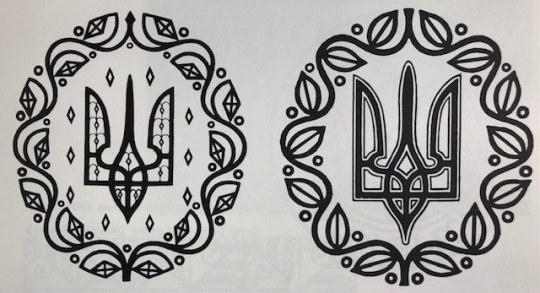
Great and lesser coats of arm of the Ukrainian People Republic by Vasyl Krychevsky, 1918
#Ukrainian People Republic#coat of arms#Ukrainian art#Ukrainian graphic#Ukraine#1910s#Vasyl Krychevsky
131 notes
·
View notes
Text
Putin facilitates Russian citizenship for all Ukrainians
Putin facilitates Russian citizenship for all Ukrainians
(ANSA) – ROME, JUL 11 – Russian President Vladimir Putin has expanded the simplified procedure for acquiring Russian citizenship for all Ukrainian residents with a decree. The Tass reports. “Citizens of Ukraine, the Donetsk People’s Republic (DPR) or the Lugansk People’s Republic (LPR) and people without citizenship who live permanently in the DPR, LPR or Ukraine, have the right to apply for…

View On WordPress
0 notes
Text
there's a whole thread of comments in my anti usa post directly tagging me but that i can't see bc people block me right after hitting send. make up your mind hdfhhf
#i do prefer not seeing the clownery#there was one isaw a part of that said like. 'do we just let ukrainians die then?' but in less polite terms#and this might come as a surprise but#diplomacy is a thing that exists specifically to avoid armed conflict#also arming people especially untrained civilians during an armed conflict results in more deaths and a longer war#and#theres the az0v batallion among those we are arming. which are nazis#theres the untrained civilians i mentioned. who are more likely to die of you give em a gun and send them on their way#there's the donetsk people's republic ppl who would NOT benefit from going back under ukrainian control as they have been bombed by az0v#for the past eight years#theres a fuckton of stuff these assholes don't understand because evidently they didn't bother looking up what diplomacy is or#what happened to Afghanistan after we sent THEM arms#spoiler: the talib4ns have them now
0 notes
Text
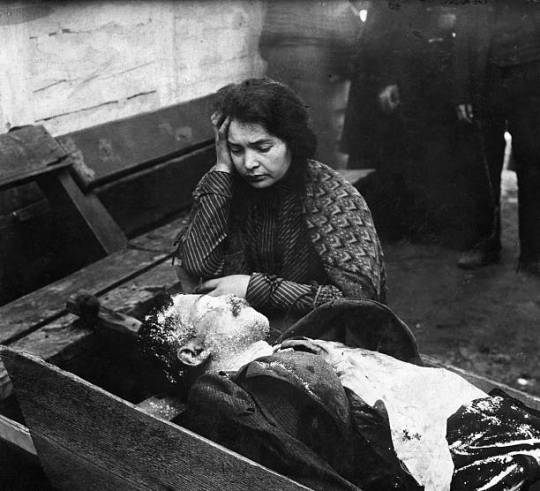
A woman mourns over the dead body of her husband killed in the Proskurov pogrom, Ukraine, 1919
The pogrom was carried during the war of independence in the western Ukrainian town of Proskurov (now Khmelnytskyi) by Ukrainian People's Republic soldiers. One witness writing of the violence said "It is impossible to image what happened here on Saturday, February 15, 1919. This was not a pogrom. It was like the great Armenian slaughter."
288 notes
·
View notes
Photo
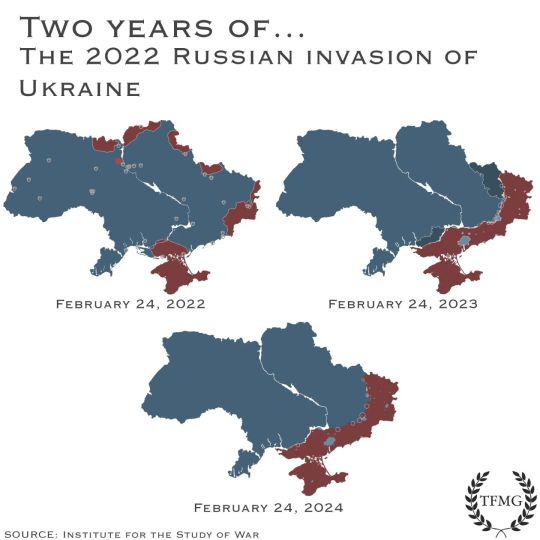
Two years of Russian invasion of Ukraine
by theflagmapguy_2.0
On 24 February 2022, Russia invaded Ukraine in a major escalation of the Russo-Ukrainian War, which began in 2014. The invasion has caused tens of thousands of deaths on both sides and instigated Europe's largest refugee crisis since World War II. About 8 million Ukrainians were displaced within their country by June, and more than 8 million fled the country by February 2023. After the Revolution of Dignity in 2014, Russia annexed Crimea and Russian-backed paramilitaries seized the Luhansk and Donetsk oblasts of Ukraine's Donbas region, sparking a regional war. In March 2021, Russia began a military build-up, amassing up to 190,000 soldiers at Ukraine's borders. Russian government officials denied plans to attack Ukraine until the day before the invasion. On 21 February 2022, Russia recognised the Donetsk People's Republic and the Luhansk People's Republic, two self-proclaimed breakaway quasi-states in the Donbas. The next day, the Federation Council of Russia authorised the use of military force and Russian soldiers entered both territories. The invasion began the morning of 24 February 2022 upon Russian president Vladimir Putin's announcement of a "special military operation" seeking the "demilitarisation" and "denazification" of Ukraine. In his address, Putin espoused irredentist views, challenged Ukraine's right to statehood, and falsely claimed that Ukraine was governed by neo-Nazis who persecuted the ethnic Russian minority. Minutes later, Russian air strikes and a ground invasion were launched along a northern front from Belarus towards Kyiv, a north-eastern front towards Kharkiv, a southern front from Crimea, and a south-eastern front from Donetsk and Luhansk. In response, Ukrainian president Volodymyr Zelenskyy enacted martial law and a general mobilisation.
210 notes
·
View notes
Text
State Senator Eric Brakey dropped truth bombs about the overthrow of the Democracy of Ukraine, Nazis, Joe Biden, and fake news:
"This posture isn't for the Ukrainian people, this isn't for the American people. This is for the Empire that now stands in the place of our once proud Republic on a mountain of corpses to maintain global hegemony. That's why in 2014 then Vice President oversaw the overthrow of the Democratically elected President of Ukraine..He was regime changed...If you doubt Washington DC had anything to do with it I have a bridge to sell you in Libya. Thanks to leaked phone calls we know for a fact that the current under secretary of State, Victoria Nuland, personally hand picked the leaders of the new government..You can hear the phone call in her own voice..Is this what Democracy looks like? I don't think so... And after the coup, the new government, urged on by local neo nazi groups like the the Azov Battalion..they succeeded in banning the speaking of Russian and launching an ethnic cleansing campaign in the eastern regions of Ukraine.."
https://twitter.com/SenatorBrakey
709 notes
·
View notes